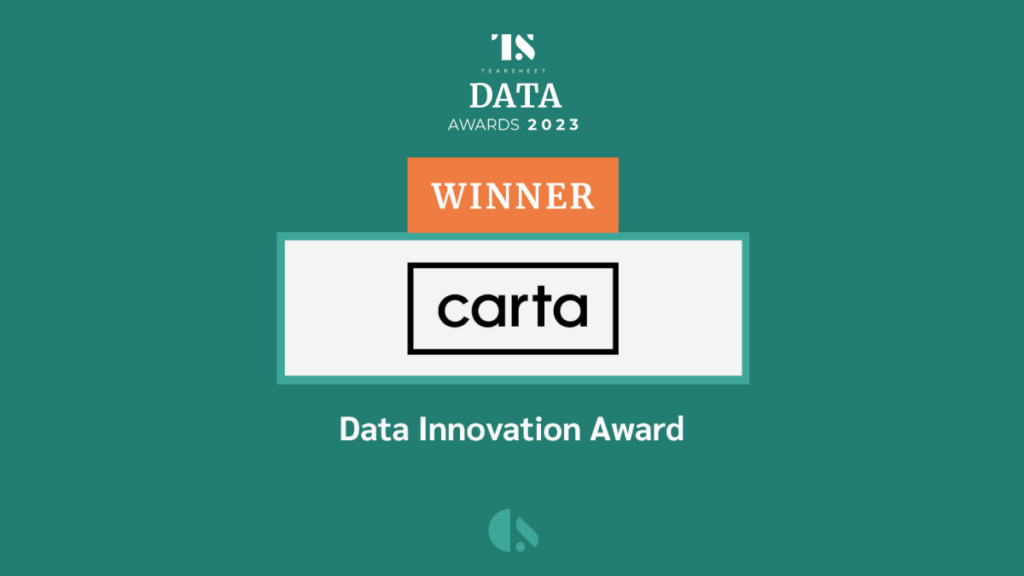Carta builds infrastructure for innovators: the founders, investors, and employees who drive the innovation economy. We lay the groundwork so businesses can grow and evolve without limitations.
Policy is infrastructure. It can drive innovation or bind its growth. It can incentivize entrepreneurship, expand investment, and facilitate the experimentation that leads to new innovations and opportunities. It can also impede the launch of an innovative startup, restrict a new product or service, or hinder the development of a company as it raises capital and transitions from private to public ownership. Policy affects nearly every aspect of the innovation ecosystem. Carta advocates for a policy framework that fuels its benefits.
Across the startup ecosystem, equity ownership fuels the cycle of innovation: Founders take a risk on themselves and their vision when they start a new business, and in exchange they retain sizable ownership in the companies they build. Employees who help build the founder’s vision receive equity compensation that allows them to participate in the upside they help create. Investors supply the capital that underpins innovative companies, and their ownership stakes reward their belief in the innovator’s vision.
Innovation and ownership: They are the core of Carta. Carta’s public policy efforts aim to make them core to our economy.
Our policy work supports efforts to:
Expand ownership opportunities for employees and investors
A policy framework that incentivizes employee ownership and greater investor access to private assets will drive innovation and prosperity.
Employee ownership
Employee ownership benefits the labor force, the company, and the broader economy. Wages have remained largely stagnant for all but the highest earners over the past four decades when accounting for inflation. Employee ownership offers a powerful corrective: By giving employees a share in the profits they help create, ownership supplements the wage with the upside of long-term, high-growth assets. In addition, equity compensation helps companies attract and empower a more engaged workforce with aligned incentives.
The existing policy framework is focused on wages and does not effectively incentivize equity ownership compensation. Carta supports policies to encourage companies to offer meaningful employee equity ownership to more employees, and better enable employee-owners to realize the full value of their equity through transparency, appropriate tax policy, and access to secondary market liquidity.
Investor access
Ownership for investors is often a question of access. Private market investment opportunities are largely reserved for institutional or wealthy investors. The average investor is generally prohibited from participating in the private markets by narrow accreditation standards. But as the private markets delivered tremendous returns for investors over the past decades, the number of public companies has declined. Companies that do go public do so later in their life cycle. As a result, investment opportunities for everyday investors have decreased and most investors are precluded from investing in and profiting from growth-stage companies, where much of the potential return on investment exists.
Carta supports appropriately expanding retail investor access to private markets, both directly and through appropriately structured funds and retirement vehicles, so that investment opportunities and potential for diversification are not limited to the economically privileged.
Incentivize equity education and transparency
Equity compensation remains poorly understood, which is one reason why policy barriers that inhibit employee ownership continue to persist.
Carta data shows that 65% of vested options expire unexercised—they’re essentially left on the table. In many cases, these options are valuable, meaning that employees are walking away from wealth they helped create. In 2021, that amounted to $580 million worth of vested unexercised employee equity that expired on Carta’s platform alone. There may be various reasons for this, but two clear drivers include a lack of transparency about the value of the equity and a lack of education about how to monetize it. No matter the cause, the result is the same: Employees are losing money they’ve earned.
Carta supports policies to help employee-owners maximize the value of their equity. Policy should incentivize employers to provide employees with clear information about the value of their equity ownership. It should also incentivize employers to equip employee-owners with foundational equity education to help them maximize the value of employee ownership.
Promote capital formation and private market liquidity
Navigating the capital-raising process can be a daunting task for many startups, funds, and businesses.
While the availability of private capital has grown substantially over the past several decades, opportunities to access these resources are limited for entrepreneurs outside of traditional capital-raising hubs and networks. To innovate and spur job creation, entrepreneurs across the country need the ability to raise capital in an effective and efficient manner.
To support the next phase of growth and innovation, private companies and their investors also need access to private-market liquidity—the ability to sell shares to other investors, converting that equity into cash. Today the binary construct between public and private means innovative companies often lack access to liquidity. A capital markets framework that creates a spectrum can better support companies across their lifecycle, including increasing liquidity. This more liquid marketplace will help companies fund growth, lower the cost of capital, make employee equity compensation more meaningful, and create a more robust onramp to the public markets.
Carta supports efforts to reduce frictions in the exempt offering framework and expand avenues for small and emerging businesses and funds to access capital, including by expanding the accredited investor and venture capital fund investment parameters. Doing so will help improve capital formation opportunities, particularly for diverse and traditionally underrepresented entrepreneurs and investors outside of traditional capital-raising hubs.
Modernize the tax code to drive growth and ownership
The tax code does not optimally support growth-stage companies. Nor does it effectively reflect the unique nature of equity compensation: It poses undue burdens on employee recipients of equity in the companies they are helping to build.
A modernized tax code can better support the expansion and effectiveness of equity compensation by shifting tax burden to the time of sale and expanding the window of time employees have to exercise their shares after departure from a company. The tax code can also better promote investment in small businesses and support entrepreneurship and job creation. Finally, a streamlined tax process will reduce administrative burdens for businesses and their owners. Many existing processes are outdated, inefficient, and confusing for taxpayers, such as 83(b) filings, which still require paper filings and physical mail.
Taxpayers, investors, and innovators also need greater guidance from Treasury and the IRS: Clearer rules that address the changing landscape of private investments and digital assets will increase investor confidence, remove uncertainty, and make it easier for employee-owners to understand tax incentives intended to support innovation.
Carta supports policies to bolster and expand tax incentives that promote equity ownership and drive investment to the startup and small business ecosystem, such as the QSBS exclusion and R&D credit. These policies incentivize investment in startups, encourage long-term investment in early-stage growth companies, and help small businesses attract and retain talented employees.
Expand access within innovation ecosystem
Within the startup ecosystem, wealth is predominantly driven by ownership rather than salaries—and women and people of color are underrepresented in equity ownership.
This disparity is fueled by a labor market that, among other factors, sees fewer women and minorities hired into early-stage private companies, where larger equity grants are more significant. Women and people of color are also underrepresented in technical roles that come with more equity compensation, and fewer diverse employees are promoted into senior positions.
Minority- and women-owned businesses and funds also face barriers to entry because they’ve historically had less access to capital than their peers. This is despite the fact that research shows diverse founders create more value for investors. Policies that democratize access to capital, lower barriers to entry, and increase investment opportunities across the population encourage a more diverse and inclusive economy.
Carta supports efforts to ensure policy considerations related to wage disparity encompass total compensation—this includes equity ownership, which can be a primary driver of wealth creation. This push toward broader and more diverse ownership must extend beyond the employee base and into the investment community, as policies that lower barriers to entry for emerging fund managers and investors will not only serve those investors, but drive capital to more entrepreneurs across the country.
Carta’s policy team is working with stakeholders across the ecosystem — private businesses, investors, policymakers, employees, and thought leaders — to advance the innovation economy and help ensure that more people can participate in the ownership economy.
We work proactively and constructively to accomplish these goals. We will be transparent about what we are doing and why we are doing it. And we will benefit from engagement. We do not have all the right answers, but are committed to pursuing them and working with our partners to implement them.
This work will be challenging and will take time. But at Carta, we believe it is a worthy endeavor. We invite conversation and collaboration that will help all of us build.
To stay up to date with our work, and for weekly updates on changes to the rapidly evolving private-market sector, sign up for Carta’s Policy Weekly Brief:


